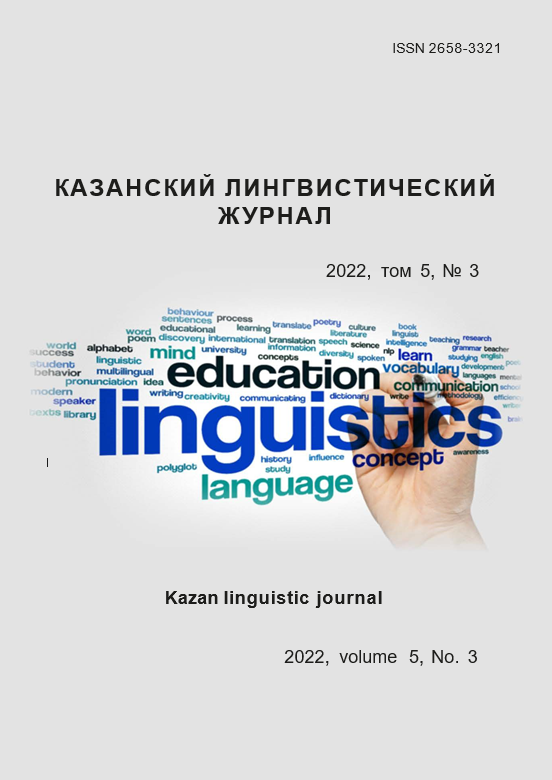To the problem of classification of modern Tatar poetry: genre canon and decanonization
https://doi.org/10.26907/2658-3321.2022.5.3.300-324
Keywords:
Tatar poetry, genre, canon, typology, decanonizationAbstract
The article is of a debatable nature and is devoted to one of the unresolved problems of modern Tatar literary criticism - the genre typology of Tatar poetry. It examines the history of the formation of canonical genres in Tatar literature, the reasons and features of their existence. The situation of changing canonical genres is traced - non-canonical: time, causes, transformational processes.The second half of the article is devoted to the analysis of the genre situation in Tatar poetry of the New Age. Socio-cultural changes at the beginning of the twentieth century and their influence on the formation of new or changing traditional genres are considered. The next stage associated with changes in the genre paradigm stands out the milestone of the 1920s and 1930s. Also, genre changes are considered in connection with the avant-garde of the 1960s–1980s and the socio-cultural situation of the turn of the 20th–21st centuries. The article also traces the position of Tatar literary scholars in the classification of poetic genres, existing views. Based on the analysis of the genre situation in Tatar poetry, genre formations are distinguished and some genre designations are proposed. In particular, based on the material of the analysis of Tatar poetry of the 20th–21st centuries, we noted that the transition to non-canonical genres allowed Tatar poetry to assimilate some Russian-European genres, among which "elegy" and "sonnet" became the most active. We also tend to explain the transformations of eastern poetic traditions in the structure, in the content of the "comic poem" and "initiation" by the influence of the corresponding Russian-European genres. At the same time, in Tatar poetry it retains its position in the twentieth century and is activated at the beginning of the 21st century in the work of young poets of the traditionally eastern, inherent in the Tatar art of the word genre - "long poem." If in the 1920s and 1930s the "long poem" contributed to the development of socio-political topics, and in the 1960s and 1980s it affected ethnic motives (native land, homeland, mother, native language), then at the beginning of the 21st century it allows Tatar poets to manifest almost all the main meaningful motives. Among the so-dived "short" poems, the genre of "brocade" stands out - on the subject covering both socio-political poems, love and landscape lyrics, continuing some of the formal features of Eastern poetry. Examples of philosophical lyrics mostly correspond to the eastern genre of "kytga," which retained its place in modern Tatar poetry. At the beginning of the XXI century, the activity of stylization for Eastern canonical genres is traced: kasyds, gazelles, fakhria, madhiya, marsia, etc. are created. The return of religious literature also contributes to the appearance of stylizations for prayers, munajats, nasikhats, etc.
References
References
Tamarchenko N.D. Genre Literary Encyclopedia of terms and concepts. ch. ed. and comp. A.N. Nikolyukin. M.: NPK «Intelvak»; 2001. P.263-265. (In Russ.)
Pak N.I. Canon. Literary Encyclopedia of terms and concepts. ch. ed. and comp. A.N. Ni-kolyukin. M.: NPK «Intelvak»; 2001. P.336. (In Russ.)
Kudelin A. B. Middle-age Arabic poet (second half of VIII - XI centuries). M.: Nauka; 1983. 262 p. (In Russ.)
Aliyeva A.T. The role of Sufism in the spread of Islamic values. Kazan: From the history and culture of the peoples of the Middle Volga region. 2020; (10):5-14. (In Russ.)
Sibgatullina A.T. Genre variety of Tatar spiritual culture. Issues of studying the history of na-tional literatures. Theory. Methodology. Modern aspects. M.: IMLI RAN; 2014. S. 140-157. (In Russ.)
Sharipov A.M. The birth of a system of poetic genres in ancient Turkic and Turkic-Tatar literature (VIII-XIV centuries). Kazan: Izd.Kazan. un-ta; 2001. 364 p. (In Russ.)
Shidfar B.Ya. Arabic classical literature system (VI-XII centuries). M.: Nauka; 1974. 253 p. (In Russ.)
Validi Gamal: Literary and historical-documentary collection / D. Abdullina, G. Minnullin. Kazan: Dgien; 2010. 624 p. (In Tatar.)
Battal G. Theory literature. Kazan Umet; 1913. 114 p. (In Tatar.)
Ibragimov G. Literature lessons. Works. Volume 7. Kazan: Tatars.kn. izd.; 2019. S.122-240. (In Tatar.)
Literary dictionary / orig.red. Akhmadullin A.G. Kazan: Tatars.kn. izd.; 1990. 237 р. (In Ta-tar.)
Khatipov F. M. Theory of literature. Kazan: Magarif; 2000. 352 p. (In Tatar.)
Tatar literature: Theory. History / D.F. Zagidullina, A.M. Zakirzyanov, T.Sh. Gylyazev. Ka-zan: Magarif; 2004. 247 p. (In Tatar.)
Zagidullina D.F. Change of world models in Tatar literature of 1906-1908. Kazan: Academic notes of KSU. 2005; (147, 2): 66–72. (In Russ/)
Kurbatov H. Rhythmic Tatar verse. Kazan; 2005. 92 p. (In Russ.)
Khabibullina A.Z. Elegy, elegiac, elegism in Russian and Tatar poetry: criteria for compara-tive research: Monograph. Kazan, RIC «Schkola»; 2021. 259 p. (In Russ.)
Zagidullina D.F. Changing models of the world: philosophical works of the early twentieth century. Kazan: Magarif; 2006. 191 p. (In Tatar.)
Yusupova N.M. Kyitga. Literary criticism: a dictionary of terms and concepts. Kazan: Magarif; 2007. S. 92. (In Tatar.)
Zagidullina D.F. Modernism in Tatar Literature of the first third of the twentieth century. Kazan: Tatars.kn. izd.;2013. 207 p. (In Russ.)
Zagidullina D.F. Tatar literature 1960-1980: avant-garde searches and experiments. Kazan: Tatars.kn. izd.; 2015. 383 p. (In Tatar.)
Zagidullina D.F. In Tatar poetry of the turn of the 20th-21st centuries (1986-2015): aesthetic landmarks and artistic searches. Kazan: Izd.Academia nauk RT; 2017. 268 p. (In Russ.)






